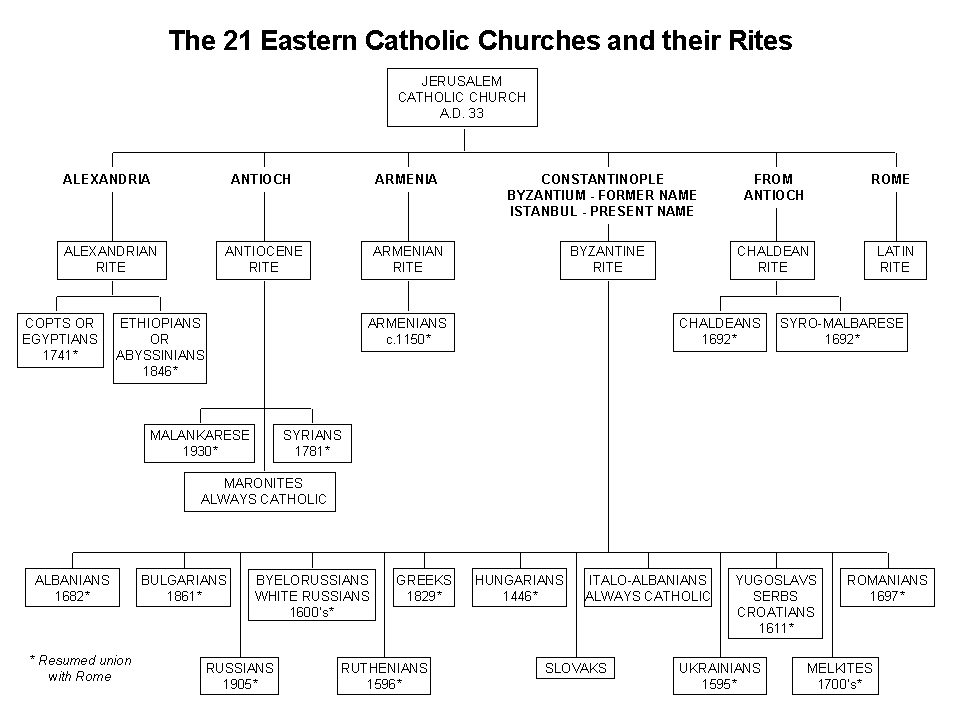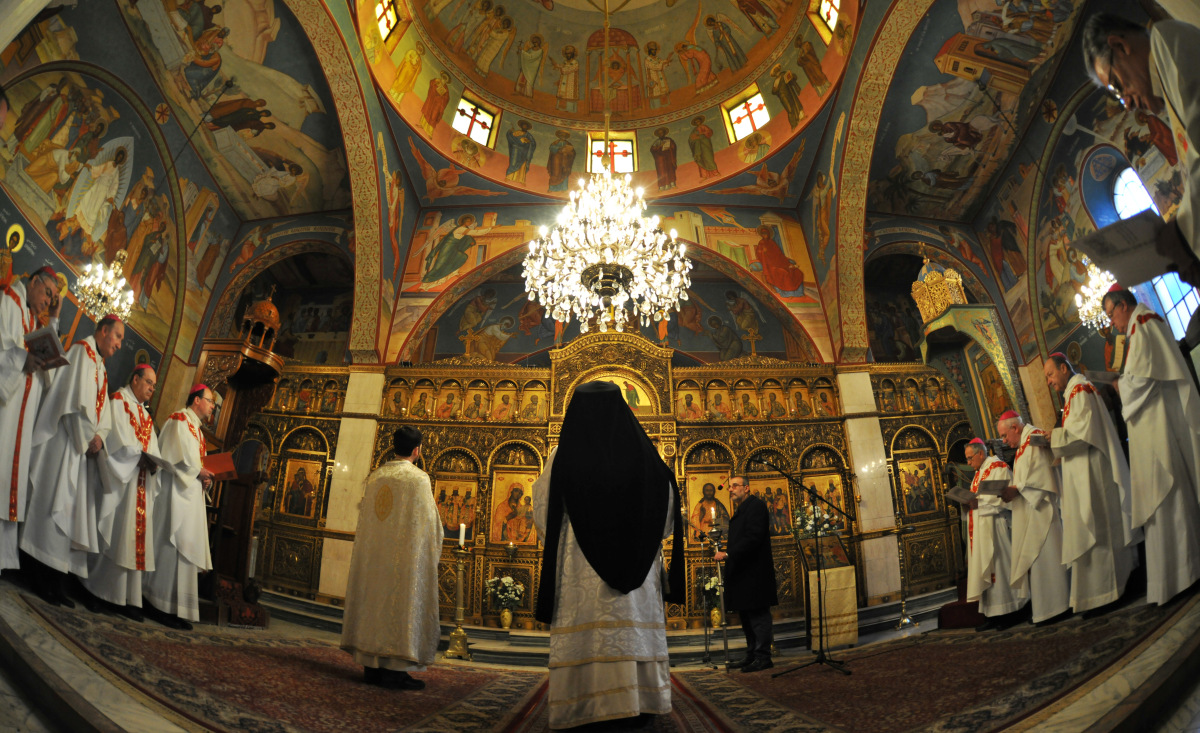I've shared this before - but with regards to Orthodox Communion with Rome, the the people who do so are known as Eastern Catholics and they do stand out for several reasons. Sometimes, what can help (if you're a visual person) is having a picture of how things slowly evolved. There are some good charts that can help with that (if interested), one of them showing the different districts and where things branched out from each.


Explaining the above, there are five original Patriarchs out of Jeruslam: Carthage, Rome, Antioch, Edessa, and Alexandria - all of which were established by the Apostles. There later came two others: Moscow - because it was evangelized over a thousand years ago by Sts. Cyril and Methodious. ..and the Malakarese and Malabarese, which are from St. Thomas the Apostle (and those are in the India region ). With this in mind, what is noted is that there are seven Patriarcates. And we can see this, in example, with the Melkite Greek Byzantine Catholic Church - a branch which is in Communion with Rome. It was case, during the separation of the Eastern Churches, that it never left Rome - but the Melkites have a sort of Communion with the Antiochean Greek Orthodox, which is considered a Bridge Church in many ways.
There are a lot of big difficulties for those who are Eastern Catholics..
As another EO noted elsewhere, "
So much of Eastern Catholicism is IN Orthodoxy - you cannot study Eastern Catholicism in isolation." ....and on the issue, a
s another noted best:
Melkites certainly know the precarious situation they occupy in the great scheme of Apostolic Christianity, and I do not think my brother Neil needs a reminder of that from anyone. Nevertheless, it does not follow that Melkites are more akin to the west than the east (wishful thinking perhaps?), your argument would have to be a lot more cogent and logical to establish that.
First, though there may be individual Orthodox who personally do not believe Melkites have a valid priesthood, it is not their place to judge these matters. In fact that is not the official stance of the church. Orthodox certainly see all Catholics as Christians, regardless of the fact that many are not in communion with us. The church is not in the business of pronouncing judgment upon other Christian bodies nor their sacraments, and neither expects nor seeks decrees of validation upon itself from outside.
Holy Orthodoxy routinely accords Roman Catholic hierachs respect, and neither endorses Roman Catholic orders nor condemns Roman Catholic orders. They are outside of the church, and are of no use to Orthodox.
Although it is not a formal practice, it is known that Melkite Catholics in Syria very often are communed in Melkite Orthodox churches as a matter of economia. I don't know if Syrian Latin-rite Catholics are accorded this same privilige. The special conditions there, as Christian minorities of a common sort, make it necessary. Many families, even whole towns, are mixed and often only one temple is allowed to be erected in a community. I know of at least one case of a temple being built specifically for use by both the Melkite Catholics and the Melkite (Antiochian) Orthodox, for separate liturgies and altars.
Because of it's more extensive network of parishes in North America, many Melkite Catholic immigrants from Syria and Lebanon worship in Antiochian Orthodox parishes, raising their children as Orthodox.
The reason, actually the only significant reason, Melkites are not in formal Communion and concelebration with Holy Orthodoxy is because the Melkites are in Communion with Rome. The issues in play are the errors Rome teaches, and RC attempts to assert those errors upon others. By sharing communion with the bishop of Rome and other bishops under Rome who teach these errors (out of charity no doubt, in the sense of love), the Melkite Catholics are formally cut off from the larger communion of Holy Orthodoxy.
I view this as a terrible sacrifice on their part.
In their efforts to keep the pipeline between east and west open for Rome the Melkites pay a very high price indeed, and I believe they know it. I do not think that fact is appreciated enough by most Latin Catholics nor latinized Eastern Catholics. To put it mildly it is a thankless position for them to be in.
That said, I do think it really is unfortunate whenever people think that Eastern Catholics all universally serve Rome - for as it has never been just Roman Catholicism with Byzantine Liturgy and plenty of Eastern Catholics (as well as Eastern Orthodox) have noted that stereotype before when it comes to what actually goes down (more shared before
here and
here). Others have often had the issue come close to home when it comes to having family in differing traditions - I've had friends and family who had the same experience. I myself grew up with it (a
s mentioned before)
Something to keep in mind is that Intercommunion agreements can sometimes be worked out between bodies with valid sacraments, even though the bodies are not united. What's interesting to consider is that Melkite Greek Catholics and The Antiochian Orthodox are very close in differing places places and there are indeed many places where Melkites and Antiochians receive communion in each others churches. Historically, it has
been the case that the Antiochians and Melkites built a church together, with both Patriarchs blessing and dedicating the Church together in a country with many Melkites and Antiochians - this not being a necessity, but an activity of unification...and to be more specific, in the 1990s, the Antiochian Orthodox and Melkite Greek Catholics built a church, St. Paul’s, that they share in Doumar, a suburb of Damascus. More on the issue can be seen in
The Melkite Initiative with the Antiochian Orthodox Church - as well as
A CALL FOR UNITY – THE MELKITE SYNOD
For those who are
Eastern Catholics/Byzantine Catholics , with those specific camps, there are some significant differences that many may not be aware of in all cases....as many Eastern Catholic rites are more similar to what occurs within Eastern Orthodoxy or Oriental Orthodoxy. It's often forgotten that
many Eastern Catholics do not accept the Filioque, Purgatory, Transubtantion, etc - with this leading to them being deemed "herectics" by Roman Catholics and yet also accused of supporting those things by EO who do not know fully some of the backgrounds.
For those who are Jewish, interesingly enough, EC is something that has held a lot of appeal when it comes to reflecting their culture. There was a discussion on the issue elsewhere that had many great insights--entitled
Can a Hebrew Catholic be comfortable in a Melkite Church? . As another noted there, the Syriac and the Chaldean/Assyrian Churches are likely the most "Semitic" traditions for a number of reasons, with their Liturgies handed down from the time when they really were Hebrew Catholics...specifically, Temple Jewish Catholics. And for other places that've given some EXCELLENT discussion on the issue:










